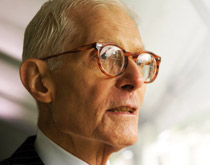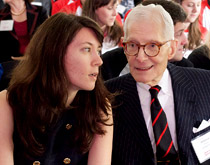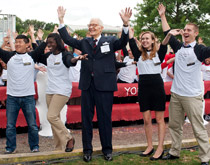As a young man, William “Bill” Dietrich didn’t know what he wanted to do with his life, but he knew he wanted to be successful. Decades later, his career achievements exceeded even his own lofty expectations and enabled him to give to Carnegie Mellon a unique and historic gift.

William Dietrich stepped onto the elevator. At his side was his company’s chief financial officer. As the doors closed, Dietrich turned to him and said, “Aside from my health and my daughter’s health, I’m never going to have another bad day the rest of my life.” No wonder: The 58-year-old chairman of Dietrich Industries had come a long way from Conneaut Lake, Pa.
In 1947, when Dietrich was nine years old, his family moved there after a run of some not-so-good days. His dad, Kenneth Dietrich, had launched a Pittsburgh-based chemical company that sold detergent. Sales boomed because of a soap shortage; the stock skyrocketed, making his dad nearly a millionaire. But then Procter & Gamble overwhelmed the Pittsburgh market with advertising. Sales plummeted. So did Kenneth’s health; the six-foot-tall man’s weight dropped to 132 pounds. He decided to get out of the soap business and move the family to the tiny resort town in northwestern Pennsylvania, where he and his wife, Marianna, would manage a small hotel.
The young boy couldn’t help but notice the impact from his family’s financial struggles. He swore he wouldn’t let that happen to him. A few years later, that resolve was stoked by a sentence in the World Book Encyclopedia. During research for a high school assignment, he opened the P volume and, by chance, came across this sentence: Princeton has sent more Rhodes Scholars to Oxford University than any other American university.
He didn’t know where Princeton was located. No matter. It became his first choice for college and where, in 1956, he would enroll, pursuing a degree in history. One key lesson he learned there occurred outside the classroom. It seemed to him that some of his classmates from wealthy families had a detectable aura of superiority. “If money is the name of the game,” he vowed, “damn it, I’m going to get the money.”
His desire to succeed didn’t translate into a particular profession: “I just went down the line: doctor, lawyer, Indian chief.” When he took organic chemistry, he crossed off doctor. Next up: lawyer. He entered Michigan’s law school. “I read a couple of cases, but my heart wasn’t into it. I realized lawyers figure out what businesses should be doing, but the guy making the decision is the guy running the business.”
He wanted to be that guy. Cross off law. He returned home, which again meant Pittsburgh, where his dad had started a new business. Originally, it was a lumber company, but that changed when there was a problem with a steel mill order. At the customer’s site, Kenneth noticed the steel workers discarding scraps of galvanized steel.
“What’s wrong with it?” he asked a foreman.
“Nothing, but it’s just a few sheets; no market for that.”
Dietrich’s dad saw an opportunity. He purchased the unwanted steel by paying higher than the scrap price but below the cost of prime steel. Customers were manufacturers that could use unexposed pieces of steel for their products. Steel companies weren’t interested in that market because it didn’t generate enough sales to make economic sense. But by bundling the odds and ends from various steel plants, he had enough steel to meet the demands of manufacturers who could use unexposed steel for items such as bottoms of stoves, backs of refrigerators, or insides of car doors.
The owner’s son became the newest salesman for the latest Dietrich company. “Dad started out paying me out-of-pocket because he wasn’t sure I was going to work out.” His mom, meanwhile, was happy to have her son home. “My mom always had unconditional love for the family,” says Dietrich. “In high school, she logged a lot of time in the principal’s office on damage-control duties for the pranks I pulled.” She still hadn’t lost faith in her son, even if his future seemed uncertain.
It turned out that her faith in him was well-founded. Within two years, the onetime aspiring doctor was doing so well he replaced the manager and was in charge of all 20 employees. There were plenty of customers, too. Dietrich Industries was a success. By 1966, Dietrich’s parents moved to Delray Beach, Fla., where his dad could play golf and his mom, after years of being the glue holding the family together, could simply relax amid the ocean breeze. By the early 1970s, the company had 19 plants throughout the country. But what Dietrich didn’t plan on was the economy falling into a recession. The company was “overleveraged” and teetering on the edge of bankruptcy. Dietrich’s dad called from Florida, asking whether they were going to make it, whether he’d keep getting his checks. Dietrich reassured him that everything was fine, even though he had his doubts. The economy rebounded by 1975 and so did sales, thanks, in part, to a new product line: steel wall studs for builders. Dietrich came up with the idea when he observed long, narrow scraps remaining after the company cut steel for customers.

By 1980, steel studs accounted for $15 million of the company’s $100 million annual sales. Dietrich, envisioning an untapped marketplace, decided to shift the entire product line to building materials. Good decision: Annual sales grew at a double-digit compound rate, reaching $350 million in 1996. Taking notice was Worthington Industries, a steel-processing company with $1.5 billion in annual sales. Worthington offered Dietrich $178 million for his company. He said, “Yes!” After the deal was finalized at the attorneys’ offices and he took that elevator ride with his CFO, he knew he would never again struggle financially. He got the money, just like he predicted at Princeton.
But that brought a new challenge: What to do with his wealth?
Taking care of his family, so they would never want for anything, seemed an obvious choice. But his parents had passed away, his mom in 1983 and his dad a year later; and he was divorced. He had a daughter, Anne, but he had already decided that the wealth wouldn’t go to him personally and, aside from a modest amount, wouldn’t go to Anne, either. “Going back to my Princeton experience, I always felt uncomfortable with inherited wealth,” he says. “It can take the fire out of you.” He explained his reasoning to Anne, who told him she completely understood.
So before he sold the business, he placed his stock into a charitable annuity trust; upon his death, it would go into The Dietrich Foundation, which would then annually distribute money to charitable causes, nearly all anchored in Pittsburgh. “[Pittsburgh] is my home,” he explains. “This is where the money was made; that’s where it ought to stay.”
He decided to manage the trust’s investments while continuing to run Dietrich Industries for Worthington. At least, that was the plan. “Within the first two years, I was thinking more about the portfolio and not enough about Dietrich Industries.” He stepped down from the company and, in 1999, at the age of 61, embarked on a new career: chief investment officer for Dietrich Charitable Trusts.
His plan was to invest in private equity funds, which are operated by general partners who raise capital from limited partners and then invest in private businesses with the limited partners’ money. The limited partners typically share 80% of the capital gains that are ultimately generated by the investments, and the general partners keep the remaining 20%. Dietrich was ready and willing to be a limited partner. One problem: The best performing funds weren’t looking for new limited partners. Getting in is much like getting accepted into an elite club.
Dietrich, whose fire still burned, took on the challenge. He boarded plane after plane and traveled around the world to network with general partners. He told his story, and his punch line never changed: “This isn’t about Bill Dietrich getting richer; it’s about charitable good works in Pittsburgh.”
The pitch worked time and again.
One general partner based in Pittsburgh hoped to secure Dietrich as a limited partner. Edward Grefenstette (TPR’98) had cofounded a private equity firm in 2000 and was seeking investors for its first fund. “We had many prominent Pittsburgh investors who kept saying, ‘You must meet Bill Dietrich.’”
Grefenstette learned that Dietrich sat on several boards and was a trustee for Grefenstette’s alma mater, Carnegie Mellon. Much to his delight, Dietrich met with him and listened intently to the details of the upstart fund.
“Afterwards,” recalls Grefenstette, “Bill said, ‘Great story! Love what you’re doing, but I have a rule that I don’t invest in first-time funds. I wish you great success. Let’s have lunch sometime to talk further.’” Despite the “courteous no,” Grefenstette never expected to hear from him again. But a few weeks later, a lunch invitation arrived.
They met every few months thereafter to discuss the markets, portfolio management, and the best opportunities globally for private equity investment. Along the way, their relationship grew. At one of those luncheons in 2006, Grefenstette told Dietrich he was planning to wind down his fund. Dietrich, who was then chair of Carnegie Mellon’s Investment Committee, mentioned that the university was conducting a search for a chief investment officer and treasurer; he encouraged Grefenstette to apply. He did. Months later, he had the job, and the two worked together closely because Dietrich exults in being an active trustee. Although he isn’t an alumnus, he proudly says the institution reminds him of his own “can-do spirit and multidisciplinary approach to problem-solving.”
As for his elevator comment that he wouldn’t have any bad days except for health, it came into play in 2009, when his doctors saw a shadow on his gallbladder; it turned out to be cancerous. He underwent an operation, and doctors told him they thought they “got it all.” But the illness made him think about the trust’s future. He began putting together the pieces, starting with Grefenstette.
“Bill approached me in 2010,” recalls Grefenstette. “He wanted me to become his chief investment officer and ‘designated successor’ as he likes to say.” The offer was too good to refuse. He told Jared Cohon, the university’s president, about his decision but reassured him. “I’ll still be pulling the oars for CMU; I’ll just be wearing a different jersey.”

He wasn’t kidding, considering the plan in place. Upon Dietrich’s death, the trust money will go into The Dietrich Foundation. There will then be a 3%-4% annual asset distribution to pre-identified beneficiaries. By far, the largest beneficiary is Carnegie Mellon, which is planned to receive 53% of the annual distributions from the foundation. It’s stipulated that those annual distributions will go into the university’s endowment, from which the university will be permitted to draw 5% annually. The disciplined structure of the gift has a double impact that is designed to ensure compounding returns for generations to come:
- Each year, under Grefenstette’s guidance, the foundation’s assets are expected to grow in excess of its annual distributions, which means more sizable distributions to CMU over time.
- Each year, the university’s endowment is also expected to grow from its own investment returns and from new distributions from the foundation, meaning larger annual draws for the university to use.
“It’s classic long-term planning by Bill,” notes Grefenstette.
Currently, the trust’s assets are valued at approximately $500 million, thanks to Dietrich’s prowess at long-term, thematic investing. That places the estimated value of Dietrich’s planned gift to Carnegie Mellon at $265 million; it’s the largest gift in the university’s history and one of the 10 largest ever by an individual to a private higher education institution in the United States.
As part of the plan, Dietrich tapped Mark Laskow to be chairman of the board of what will become The Dietrich Foundation. The two met while serving on a civic board together. The investment manager understands why Dietrich picked the university as the primary benefactor: “My son [Thomas Laskow (HS’07)] graduated from CMU with a degree in creative writing. He’s now in medical school. And I think that says it all—a university that turns out creative writing students but broadens them to the extent where they’re capable of doing well in medical school. A gift that benefits that kind of activity has got to be a good thing.”
And, in fact, specific support from the endowment gift will go to what is now renamed the Marianna Brown Dietrich College of Humanities and Social Sciences. Like Dietrich’s rise over the decades, so, too, has that college excelled. Faculty members have received numerous international awards, and SAT scores of admitted freshmen have increased a remarkable 12% in the past 20 years. Dietrich chose to name the college after his late mother to honor her unconditional love.

The gift comes during the university’s $1 billion Inspire Innovation fundraising campaign. “Bill’s gift is sort of a Good Housekeeping Seal of Approval to people of all means—it speaks to the safety and merit of investing in this institution,” says Robbee Kosak, the university’s vice president of advancement and chief fundraiser.
Under normal circumstances, learning of such a gift would have elated President Cohon. But the circumstances weren’t normal. In fall 2010, he went to visit Dietrich, who was no longer living at his home. The cancer had returned, and doctors told him after he underwent a 12-hour operation that nothing more could be done. He was living in a hospice.
“I went to see him,” recalls Cohon “to pay my respects, talk about all he had done for the university. But Bill, being Bill, whipped out a folder with a spreadsheet, and he took me through it.”
Given Dietrich’s health, Cohon says, it was a “bittersweet” moment. But what perhaps the hospice—and maybe even the doctors didn’t take into account—is that Dietrich’s fire still burns: “I didn’t die soon enough to suit Medicare, and they kicked me out—they weren’t going to pay for it anymore, so I went back to my place.” He says it’s not possible the cancer is in remission, but he isn’t depressed about what’s to come. “They stamped me a one-way ticket, and my train leaves a little sooner than everybody else’s. But I have no regrets; I went further in life than I ever thought I would go, and I’ve enjoyed every minute of it.”
He still commutes daily to his Pittsburgh office. Grefenstette is the CIO so Dietrich can work full-time on his book about the relationship between China and the United States. “I’m probably about 60% done,” he estimates. It’s a book he intends to finish; it will go alongside two others he wrote: In the Shadow of the Rising Sun: The Political Roots of American Economic Decline (Penn State University Press, 1991) and Eminent Pittsburghers: Profiles of the City’s Founding Industrialists (Taylor Trade, 2011).

He took a brief respite from his routine on September 7, when his historic gift was announced to the university community during a tribute to him on the Pittsburgh campus. Reflecting on the magnitude of the donation, Cohon says, “It’s a unique gift—one that will give forever—from a unique man.”
Dietrich describes it another way: “I’m not a religious person, but this is my immortality.”
Robert Mendelson is executive editor of this magazine.
MESSAGE FROM PRESIDENT JARED L. COHON:
It is with deep sadness that I share the news that longtime trustee and university benefactor Bill Dietrich passed away October 6, 2011, of cancer. He was 73.
Carnegie Mellon University will be forever grateful to Bill for his service and philanthropy. Carnegie Mellon and Pittsburgh have lost a great friend.
Related Links:
Flickr Photos of the Event
Bill Dietrich & Carnegie Mellon University
Carnegie Mellon receives $265 million pledge
CMU gets $265 million gift from William S. Dietrich II



